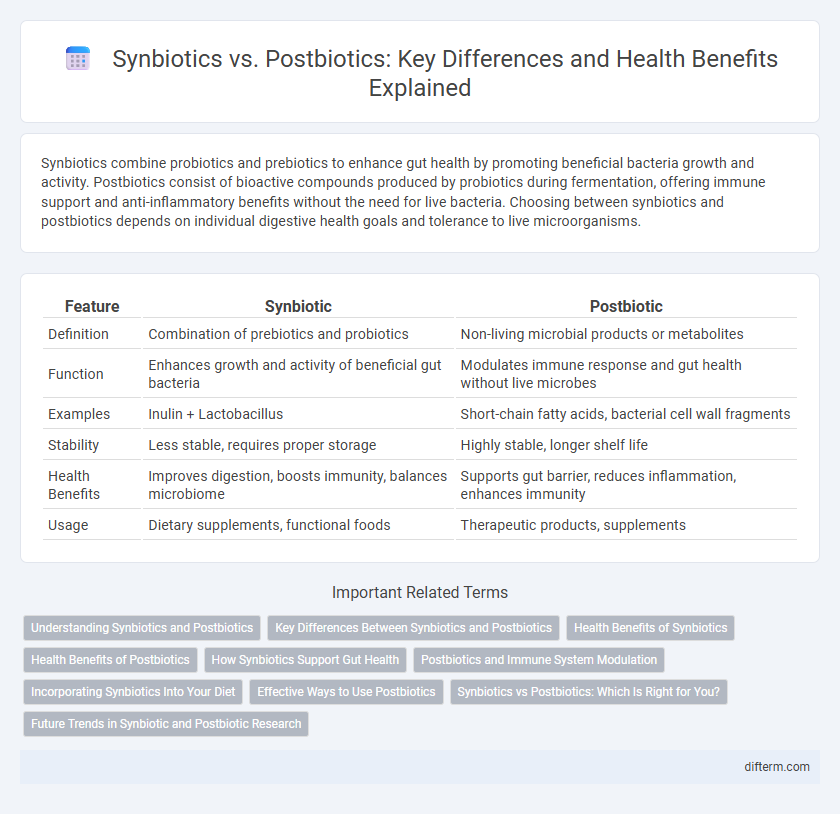Synbiotics combine probiotics and prebiotics to enhance gut health by promoting beneficial bacteria growth and activity. Postbiotics consist of bioactive compounds produced by probiotics during fermentation, offering immune support and anti-inflammatory benefits without the need for live bacteria. Choosing between synbiotics and postbiotics depends on individual digestive health goals and tolerance to live microorganisms.
Table of Comparison
| Feature | Synbiotic | Postbiotic |
|---|---|---|
| Definition | Combination of prebiotics and probiotics | Non-living microbial products or metabolites |
| Function | Enhances growth and activity of beneficial gut bacteria | Modulates immune response and gut health without live microbes |
| Examples | Inulin + Lactobacillus | Short-chain fatty acids, bacterial cell wall fragments |
| Stability | Less stable, requires proper storage | Highly stable, longer shelf life |
| Health Benefits | Improves digestion, boosts immunity, balances microbiome | Supports gut barrier, reduces inflammation, enhances immunity |
| Usage | Dietary supplements, functional foods | Therapeutic products, supplements |
Understanding Synbiotics and Postbiotics
Synbiotics combine probiotics and prebiotics to enhance gut health by supporting the growth of beneficial bacteria. Postbiotics refer to the bioactive compounds produced by probiotics during fermentation that provide health benefits without containing live microorganisms. Understanding the distinct roles of synbiotics and postbiotics helps optimize digestive health strategies and improve immune response.
Key Differences Between Synbiotics and Postbiotics
Synbiotics combine probiotics and prebiotics to enhance gut microbiota by supporting beneficial bacteria growth, whereas postbiotics consist of bioactive compounds produced by probiotic microorganisms, such as enzymes, peptides, and cell wall fragments. Synbiotics primarily aim to improve gut health through microbial synergy, while postbiotics deliver direct health benefits via metabolic byproducts without live bacteria. Key differences lie in synbiotics' reliance on live microbes plus substrates versus postbiotics' focus on bacterial metabolites and signaling molecules.
Health Benefits of Synbiotics
Synbiotics combine probiotics and prebiotics to enhance gut microbiota balance, promoting improved digestion and stronger immune function. They support nutrient absorption and reduce inflammation by creating a favorable environment for beneficial bacteria. Studies show synbiotics can help prevent gastrointestinal disorders and enhance metabolic health more effectively than postbiotics alone.
Health Benefits of Postbiotics
Postbiotics enhance gut health by delivering bioactive compounds such as short-chain fatty acids, enzymes, and peptides that promote anti-inflammatory effects and strengthen the intestinal barrier. They support immune system regulation and improve metabolic functions, reducing risks of infections and chronic diseases. Unlike synbiotics, postbiotics do not require live microorganisms, offering greater stability and safety for various health applications.
How Synbiotics Support Gut Health
Synbiotics combine probiotics and prebiotics to enhance gut microbiota diversity and improve digestive health. They promote the growth of beneficial bacteria and enhance the gut barrier function, reducing inflammation and supporting nutrient absorption. Clinical studies demonstrate synbiotics' effectiveness in alleviating irritable bowel syndrome (IBS) symptoms and preventing gastrointestinal infections.
Postbiotics and Immune System Modulation
Postbiotics are bioactive compounds produced during the fermentation process by probiotic bacteria that directly influence the immune system by enhancing anti-inflammatory responses and strengthening gut barrier functions. Research indicates postbiotics modulate immune cells such as macrophages and dendritic cells, promoting a balanced immune reaction and reducing the risk of infections and autoimmune diseases. Their stability and safety profile make postbiotics a promising therapeutic option for immune system modulation compared to synbiotics, which rely on live microorganisms and prebiotics.
Incorporating Synbiotics Into Your Diet
Incorporating synbiotics into your diet enhances gut health by combining probiotics and prebiotics that synergistically improve the balance of beneficial bacteria. Foods such as yogurt with inulin or fortified supplements provide effective synbiotic sources promoting digestion and immune function. Regular consumption of synbiotics supports improved nutrient absorption and reduces gastrointestinal disorders compared to using postbiotics alone.
Effective Ways to Use Postbiotics
Postbiotics, which are metabolic byproducts produced by probiotic bacteria, offer targeted health benefits by enhancing gut barrier function and modulating the immune system. To maximize their efficacy, incorporate fermented foods rich in postbiotics like kimchi, sauerkraut, or supplement formulations standardized for specific bioactive compounds such as short-chain fatty acids and enzymes. Regular consumption of postbiotic products can improve digestive health, reduce inflammation, and support overall microbiome balance without the viability concerns associated with probiotics and synbiotics.
Synbiotics vs Postbiotics: Which Is Right for You?
Synbiotics combine probiotics and prebiotics to enhance gut health by promoting beneficial bacteria growth, while postbiotics consist of bioactive compounds produced by probiotics that support immune function and reduce inflammation. Choosing between synbiotics and postbiotics depends on individual health goals, such as improving digestion with synbiotics or targeting immune support with postbiotics. Research indicates synbiotics may be more effective for overall microbiome balance, whereas postbiotics offer targeted therapeutic benefits without live bacteria.
Future Trends in Synbiotic and Postbiotic Research
Emerging research in synbiotics and postbiotics highlights their potential to revolutionize personalized nutrition through targeted modulation of the gut microbiome, enhancing immune function and metabolic health. Advances in multi-omics technologies and machine learning enable precise identification of beneficial microbial strains and bioactive metabolites, accelerating the development of next-generation synbiotic and postbiotic formulations. Future trends emphasize clinical validation, safety profiling, and integration in functional foods and pharmaceuticals to address chronic diseases and promote overall wellness.
Synbiotic vs Postbiotic Infographic

 difterm.com
difterm.com